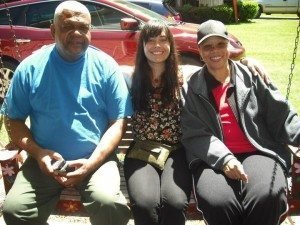It wasn’t too long ago that I traveled through South America and Costa Rica to witness hundreds of people striking against the government to fight for basic rights—clean air and clean water. It was those experiences that encouraged me to pursue a degree in environmental engineering, with a goal to work with developing countries to help them access the two basic things we take for granted in the United States. Never did I think I would come across a small town in the United States fighting for the same rights, and not being heard.

Crossett, Ark., is a small American working-class town that few people have heard of, but one with a big environmental problem. People in this community have cancer; their neighbors live on respirators, and are breathing air allegedly being polluted by a large company called Georgia-Pacific. Georgia-Pacific produces household paper items like Brawny paper towels, Quilted Northern toiler paper, and Dixie paper cup products. It is also the only plant in the community and employs most of the town it is polluting.
I heard about this town thanks to Erica Sardarian, co-director and producer of a documentary on Crossett. Erica is working on the documentary with her brother, Edgar Sardarian, producer and editor, and with Natalie Kottke, director and producer. Their goal is to bring awareness to what’s happening in Crossett and help the town get the representation it deserves to improve their daily lives. According to Kottke, Crossett’s story must be told because most of the town’s residents can’t speak for themselves for fear of losing their jobs. The town relies on their pastor, David Bouie, and his wife to provide them with a voice.
In an interview with Kottke, Bouie told her that “people in 11 out of 15 homes on my small street have died of cancer.” Wilma Subra, an award-winning chemist testing the air and water quality in the community, told the residents, “This facility produces a huge number of chemicals into the air, land, and water. They would like you to believe that all of it remains on site.” In reality, the company seems to be dumping most of its waste directly into the air and water. Crossett is not the only town that needs to worry about the discharge—both water and air migrate across the land, eventually ending up in our own environment, thus becoming our issue as well.
Anthony Samsel is a scientist writing a preliminary report about Crossett that details the progress and test results in relation to public health. According to him, “Between the paper mill, formaldehyde plant, plastic resin manufacturing, and other chemical operations, the potential for chemical exposure and risks to public health are substantial. Just looking at the paper mill operation alone sent up red flags. Our field tests show that the residents of Crossett are being chemically assaulted with hydrogen sulfide.”
Hydrogen sulfide is an extremely toxic and irritating gas that has a strong odor of rotten eggs. Formaldehyde is highly toxic with a characteristic pungent and irritating odor. The EPA has not investigated the environmental conditions in Crossett, nor has Arkansas’s environmental protection office done any testing to protect residents from the pollutants being discharged into the air and water. Bouie reached out to for help in a 2011 article in the Huffington Post, directing his pleas to Charles and David Koch, billionaire brothers and owners of Georgia-Pacific. “I pray that I might be able to convince you to clean up this mess and relocate us like Georgia-Pacific did for other communities like ours. We cannot relocate on our own.”
Kottke and the Sardarians are working hard to produce the documentary telling Crossett’s story, and their goal is to raise enough awareness to provoke action from the EPA and Georgia-Pacific to relocate the residents and clean up their town. They have set up a donation fund on Indiegogo (www.indiegogo.com/crossettdocumentary) for those willing to help the cause. If you aren’t able to donate, you will still be a great help by spreading awareness and sharing this story.
It makes me feel proud to see Armenians doing good for complete strangers. Sardarian has said that these people have become her family and she will do whatever it takes to give them a better life. By helping one town’s environmental woes, she is inevitably helping us all!
You can read more about the Koch Brothers at www.kochbrothersexposed.com, and learn facts such as this one: Koch Industries has an annual production capacity of 2.2 billion pounds of the carcinogen formaldehyde. The company has worked to keep it from being classified as a carcinogen even though David Koch is a prostate cancer survivor.
***
Dirt Cake Recipe
2 egg yolks
2 cups milk
½ cup sugar
¼ cup cocoa powder
3 tablespoon cornstarch
1 package Oreo cookies
One small, clean flower pot
Fresh flowers and gummy worms for decoration
Mix the sugar, chocolate, cornstarch and milk in a saucepan and bring to boil, whisking constantly (Note: Custard will not thicken unless milk has boiled.)
- Whisk egg yolks in a bowl until frothy, and mix ¼ cup of the milk mixture from the saucepan to temper the egg mixture. Pour egg mixture into the saucepan and continue whisking.
- After 3-5 minutes, remove pan from heat, and continue whisking until mixture thickens completely. Allow pudding to cool to room temperature before cooling completely in the refrigerator.
- Finely chop the Oreo cookies in a food processor. Layer in flower pot, starting with cookies and then pudding mixture, repeating layers and ending with the Oreo “dirt” layer. Garnish with fresh flowers and gummy worms.


Be the first to comment